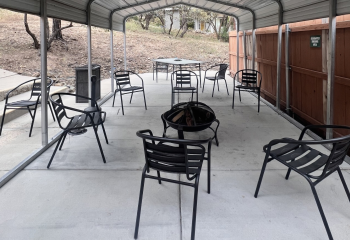More About Rehabs for Cocaine
Cocaine is a stimulant drug that is derived from the coca plant and comes in a white, powdery substance or in an impure, rock-like substance (known as crack cocaine)(1). Powder cocaine is usually snorted or injected, while crack cocaine tends to be smoked(1,2).
Classified as a Schedule II substance by the U.S. Drug Enforcement Administration, cocaine possesses high potential for misuse, which can lead to severe psychological and physical dependence(1).
Effects of Cocaine
The short-term effects of cocaine can include(3):
- Narrowed blood vessels.
- Increased heart rate and blood pressure.
- Heart rhythm problems.
- Increased heart attack and stroke risk.
- Elevated body temperature.
- Anxiety.
- Paranoia.
- Psychosis.
- Insomnia.
- Seizure.
- Coma.
Long-term and/or chronic cocaine use can lead to mild to severe health effects, such as(1,3):
- Loss of sense of smell.
- Nasal passage inflammation and damage.
- Nosebleeds.
- Trouble swallowing.
- Hoarseness.
- Track marks and other localized skin inflammation/infection (if you inject it).
- A risk of contracting infectious diseases like HIV or hepatitis (if you inject it).
- Psychosis.
- Reduced blood flow in the gastrointestinal tract that can lead to tears and ulcerations.
- Damage to your heart, leading to cardiovascular issues like inflamed heart muscle, chest pain, stroke, or heart attack.
- Kidney, lung, brain, or liver damage.
- Tolerance.
- Dependence.
Risks of Cocaine
Since cocaine is so addictive, it’s possible for users to ingest too much and overdose. Overdose occurs when a high amount of cocaine is ingested, and the stimulating effects on the central nervous system cause life-threatening reactions. Symptoms of an overdose include heart attacks, seizures, or respiratory failure, where breathing becomes slow, shallow, or even stops completely. Without immediate medical intervention, a cocaine overdose can be fatal.
Drug dealers may also cut cocaine with cheaper ingredients to up their profits, such as fentanyl, a potent synthetic opioid that is extremely easy to overdose on. Ingesting a small amount of cocaine that has fentanyl can be life-threatening. Fentanyl overdose typically causes respiratory failure and should be treated the same way as a cocaine overdose.
Signs Someone May Be Addicted to Cocaine
Cocaine addiction (clinically known as a stimulant use disorder) is marked by a number of specific signs and symptoms. While you can educate yourself about these signs and symptoms and keep watch for them, it is important to remember that only a professional can provide an official diagnosis. According to the Diagnostic and Statistical Manual of Mental Disorders (DSM-5), the criteria for stimulant use disorder include(4):
- Taking stimulants in larger amounts or longer than intended.
- Challenges with cutting down or controlling stimulant use.
- Spending large amounts of time trying to acquire stimulants, use stimulants, or recover from the effects of stimulants.
- Intense cravings for stimulants or having a strong desire to use stimulants.
- Difficulty fulfilling obligations at home, work, or school as a result of stimulant use.
- Continuing to use stimulants despite the damage it causes to interpersonal relationships.
- Giving up important activities because of stimulant use.
- Using stimulants in situations where it is dangerous to do so.
- Continuing to use stimulants despite physical or psychological problems that may be caused or exacerbated by use.
- Developing tolerance or withdrawal symptoms.
If you start to see some or all of these signs and symptoms occurring in a loved one, reaching out to a qualified professional may be able to help.
Rehab for Cocaine
After detox, you’ll begin therapy to get to the root of your addiction and learn coping skills to manage cravings. Some people with cocaine addiction may need a more intensive level of care to help monitor and manage their symptoms. When talking to your doctor, consider discussing which level of care best fits your needs:
- Inpatient: You’ll live in a treatment center or hospital-like setting and have 24/7 monitoring.
- Partial hospitalization (PHP): You’ll meet 5-7 times a week for a full day.
- Intensive outpatient (IOP): You’ll meet 3-5x per week for several hours at a time for more intensive care.
- Outpatient (OP): You’ll meet 1-2x per week with your provider and others in treatment.
Therapy for Cocaine Addiction
Therapy plays an essential role in the treatment of all types of addiction, including cocaine addiction. You can learn to cope with underlying factors that may lead to addiction when you participate in therapy. Some standard therapies you may encounter while in treatment for cocaine addiction may include:
- Cognitive-Behavioral Therapy (CBT): CBT is often used in substance use treatment to help people develop coping skills that aid in the prevention of relapse and address harmful behaviors associated with substance use(5).
- Contingency Management: Contingency management is a rewards-based intervention commonly used in cocaine addiction treatment. It involves therapist-led reinforcement through rewards for positive behaviors(5).
- Group Therapy: Group therapy can help patients in treatment by reinforcing peer discussion. Group therapy promotes a drug-free lifestyle and often has positive effects when combined with individualized drug counseling(5).
- Family Therapy: This type of therapy can bring the patient additional support through the recovery process. Family therapy, as part of a treatment program, can enhance the benefits that someone gains from treatment, as well as improve upon the lives of the patients’ loved ones(5).
- Motivational Interviewing: Motivational interviewing is used in substance use treatment programs to help clients resolve ambivalence to change. This modality shows clients what behaviors keep them from making the desired changes so they can modify those behaviors(6).
Questions to Ask Your Provider
If you’re looking for cocaine treatment, talk to your primary care doctor. They can refer you to a substance use rehab to start your recovery.
When talking to your provider, consider asking these questions:
- What are the benefits of the different types of treatment available? What are the risks?
- Are there any specific medical or psychiatric assessments I should do before starting treatment?
- What does relapse prevention planning look like?
- Is there treatment that can address any co-occurring disorders that I have?
- Does insurance cover treatment?
How Can I Find Support?
- Rehabs for Cocaine
- Telehealth Provider
- Talk to a supportive friend or family member
- Talk to your primary care physician
Sources
1. National Institute on Drug Abuse. (2024). Cocaine.
2. U.S. Drug Enforcement Administration. (2020). Cocaine.
3. National Institute on Drug Abuse. (2023). Commonly Used Drugs Charts. Cocaine Coke Crack.
4. American Psychiatric Association. (2013). Diagnostic and statistical manual of mental disorders (5th ed.). Arlington, VA: American Psychiatric Association.
5. National Institute on Drug Abuse. (2018, January). Principles of drug addiction treatment: A research-based guide (third edition).
6. Substance Abuse and Mental Health Services Administration. (2021). Using motivational interviewing in substance use disorder treatment.






































































































































